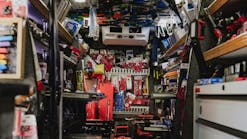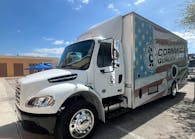As vehicles continue their march towards computerization and onboard technology, the trend isn’t limited to light duty. While heavy duty trucks used to mean heavy duty mechanics (and this is still true to an extent), truck manufacturers are increasingly implementing computer systems similar to those found in automotive. New-to-market heavy duty scan tools are the answer to this growing segment of diagnosis and repair. Here’s what you need to know about this product category.
Who’s buying?
“Computerized trucks have become much more popular in the past few years, compared to 20 years ago when they didn’t even have a readable ECM (electronic control module),” says Ron Hambrick, a diagnostic specialist with Mac Tools.
The move to incorporate more technology into vehicles isn’t limited to new models. CanDo International, Inc. Marketing Director Victor Rivilla reports the trend of retrofitting older trucks, especially in California, [steered] his company towards dedicating nearly 100 percent of its efforts into heavy duty (HD) diagnostics development.
“The rise of medium duty truck imports has also contributed tremendously to the need for HD diagnostics outside Class 4-8,” Rivilla says.
He mentions that standardization of protocols and Right to Repair are still not 100 percent mandated in the heavy duty segment. As such, he says developing diagnostic tools for this market can be difficult and time-consuming, causing the list of HD scan tool manufacturers to be “slim” in comparison to that of the passenger car market.
Regardless, as heavy duty vehicles grow more complex, technicians will need a good HD tool to start diagnosing the multiple systems on the vehicles. The modules a technician is required to communicate with are ABS, Engine, Transmission, Emission Control, and possibly accessories like HVAC to name a few.
“Aftermarket heavy duty scan tools started to become more effective with the advent of SAE Standard codes and data,” says Matt Stein, senior product manager with Bosch. “This means scan tools makers can develop products that provide basic coverage for vehicles, allowing a technician to accomplish all they need to repair heavy duty trucks.”
HD scan tools undergo constant upgrades and improvements. Emiliano Morales is the director of international sales and business development with Cojali USA Inc., which manufacturers the Jaltest HD Diagnostics tool.
“HD tools can be quite complicated at first if not properly demonstrated,” Morales says “We understand that diagnostics for these shops have recently become fundamental to have and understand.”
Heavy duty scan tools may also come with a great deal of technical support on the back-end.
“We believe the industry needs accessible technical help and solutions from diagnostics manufacturers, so independent shops can be more competitive in the market,” Morales says. “What happens after the technician has found a fault code? What is the next step to fix the vehicle? Our Jaltest Diagnostics tool provides these shops with added solutions … allowing them to access a wider range of vehicle makes and models [and] tackle new business lines, such as trailer diagnostics, Ag(ricultural) equipment diagnostics and off-highway maintenance.”
Selling points
To make a sale, distributors first need to follow
the demand and seek out fleet garages.
“The first question is, are you calling on heavy duty shops?” Vice President Harlan Siegel of Launch Tech USA says. “You have to be honest and make sure you’re calling on heavy duty shops. If not, maybe you should stop by.
“You do have these shops that do heavy duty trucks, but that fleet may also have F150s or 250s or other vehicles that are on OBD-II (16-pin). To have a tool that can do all is even better, and that’s our offering.” Siegel says they do all light cars, all light trucks, all medium duty and heavy duty.
To begin the conversation, mobile distributors should find out what their customers work on, and what they require of a scan tool.
Some of the top features associated with today’s heavy duty scan tools include updates (what it comes with and what’s available down the road), remote connectivity capabilities and overall quality.
Updates are a hot topic in the world of scan tools, says TEXA General Manager Dario Peruch. He says customers appreciate being given a choice whether to update their tool. Many companies now offer regular updates—sometimes weekly. They may also come with preloaded software. For example, FCAR tools come with the first two years of updates included with the purchase.
Many OEMs are also working in the direction of remote connectivity. TEXA is one such company launching a remote diagnostic tool.
“Imagine a mechanic is able to assist a driver with forcing a filter regeneration from hundreds of miles away from the truck,” Peruch says. He believes this gives workshops and fleet managers more opportunities.
In addition, Launch Tech’s Siegel says shop owners may also be seeking diesel particulate filter (DPF) regens (needed on Class 4 through 8 vehicles) and fuel injector coding.
“There’s a myriad list of relearns and capabilities throughout that vehicle, based on the truck,” Siegel says. “It’s not just the brand of the truck, but what brands are within that truck."
Michael Flink, Autel’s director of TPMS and commercial sales North America adds, “With heavy duty, year-make-model is not nearly as important as the individualized systems. In light duty we think in terms of Chevy and we’re looking at all Chevy systems, or GM or Ford. With a truck, you can actually line up two Freightliners ... that are absolutely identical, but you’re really looking at the shell Freightliner made. What’s inside that shell can be completely different and custom-ordered by the user for different engines — Detroit Diesel, Cummins, Caterpillar, different transmissions like Allison and Meritor, different brake systems like Wabco and Bendix, and so forth.”
Finally, this is one sales category where customers may not mind spending a bit more for a good quality product.
“Quality seems to be [more] important than ever,” TEXA’s Peruch says. “Mechanics prefer to spend a little bit more on premium tools nowadays.”
Wrap things up by offering a “road test” with the tool. Siegel says shop owners will let you know what they like and don’t like, what they need or don’t need.
Keep in mind
It’s possible that shops who service heavy duty vehicles may be new to heavy duty scan tools. They might wonder what’s available, and what amount of training is required on their part.
“Not all customers are tech savvy,” says Elbert Chen, branch manager at FCAR TECH USA. “Some may need more help in understanding how to properly use a scan tool.”
TEXA’s Peruch adds, “There is no perfect tool; some are better than others, but overall there is no universal solution … Listening to customers, giving advice, specific training and assistance are essential procedures.”
Peruch cautions distributors to “not focus too much on the sale.” He says the objective is the customer’s satisfaction, not profit.
“Establishing a relationship is crucial and will drive future sales,” Peruch says. “In this way there is more monetary return in the long-term.”
Here to stay
Kelly Chancey, a distributor with Matco Tools, has been selling scan tools to the aftermarket for more than 30 years. He says heavy duty diagnostics are here
to stay.
“By no stretch have the systems on these trucks caught up with cars as far as what they’re doing,” Chancey says. “But, I don’t think they’re very far behind. In the big-truck market we’re (the industry is) light years ahead of where we were when we launched. There’s more technical information available, quality of programs.”
Launch Tech’s Harlan Siegel adds, “The heavy duty truck market, from what we’ve seen, is very grateful to have an aftermarket offering to get some of this stuff done.”
As heavy duty diagnostics become more thorough and reliable, technicians no longer need to turn work over to local dealerships. They can make the repair and retain the revenue, too.



